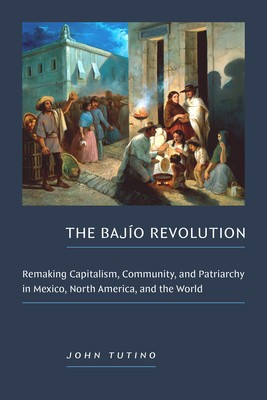
- We will send in 10–14 business days.
- Author: John Tutino
- Publisher: Duke University Press
- ISBN-10: 147803193X
- ISBN-13: 9781478031932
- Format: 15.2 x 22.9 x 3.2 cm, minkšti viršeliai
- Language: English
- SAVE -10% with code: EXTRA
Reviews
Description
In The BajÃÂo Revolution, John Tutino examines how popular insurgents reshaped Mexico, the US, and global capitalism during the nineteenth century. After detailing New Spain's silver-driven wealth, Tutino shows how the BajÃÂo insurgency of 1810-1820 broke silver flows and Asian trades, opening markets to industrial cloth made in England of cotton made by enslaved hands in the US South--while BajÃÂo women claimed pivotal roles making maize to sustain families and guerrilla bands. As Mexico gained independence in 1821, mining remained broken while family growers held strong. Then in the 1830s, a new silver-industrial capitalism fed by family maize makers rose in the BajÃÂo. Women still led rural families and took on mill labor; one woman became Mexico's leading silver capitalist. Facing that competition, in the 1840s the US invaded to claim Texas for cotton and slavery and California for gold. The new Mexican capitalism carried on until the US mobilized gold taken in war to join a global gold standard in the 1870s--blocking Mexico's independent route to capitalism.
EXTRA 10 % discount with code: EXTRA
The promotion ends in 21d.16:37:32
The discount code is valid when purchasing from 10 €. Discounts do not stack.
- Author: John Tutino
- Publisher: Duke University Press
- ISBN-10: 147803193X
- ISBN-13: 9781478031932
- Format: 15.2 x 22.9 x 3.2 cm, minkšti viršeliai
- Language: English English
In The BajÃÂo Revolution, John Tutino examines how popular insurgents reshaped Mexico, the US, and global capitalism during the nineteenth century. After detailing New Spain's silver-driven wealth, Tutino shows how the BajÃÂo insurgency of 1810-1820 broke silver flows and Asian trades, opening markets to industrial cloth made in England of cotton made by enslaved hands in the US South--while BajÃÂo women claimed pivotal roles making maize to sustain families and guerrilla bands. As Mexico gained independence in 1821, mining remained broken while family growers held strong. Then in the 1830s, a new silver-industrial capitalism fed by family maize makers rose in the BajÃÂo. Women still led rural families and took on mill labor; one woman became Mexico's leading silver capitalist. Facing that competition, in the 1840s the US invaded to claim Texas for cotton and slavery and California for gold. The new Mexican capitalism carried on until the US mobilized gold taken in war to join a global gold standard in the 1870s--blocking Mexico's independent route to capitalism.


Reviews